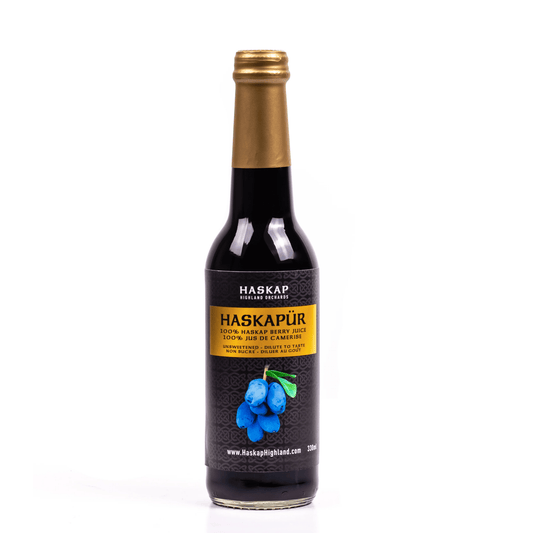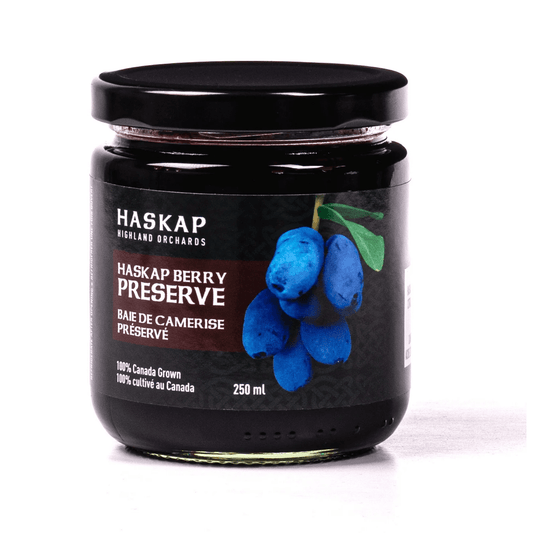Due to their rich nutritional profiles and health benefits, Berries are often labelled a superfood. Among these, Haskap berries and blueberries are frequently touted for their extraordinary antioxidant content. But which one truly reigns supreme? Let’s dive into the science behind these two super berries to uncover their unique benefits and determine the better choice for your health needs.
Nutritional Powerhouses: A Side-by-Side Comparison
Haskap Berries (Lonicera caerulea)
- Anthocyanins: Haskap berries are particularly rich in anthocyanins, a type of flavonoid with potent antioxidant effects. A study in Science Direct reported that Haskap berries contain higher levels of anthocyanins than other berries, including blueberries.
- Vitamin C: These berries boast impressive vitamin C content. According to research published in Science Direct, Haskap berries contain more vitamin C than oranges, significantly boosting the immune system.
- Polyphenols: Beyond anthocyanins, Haskap berries are rich in other polyphenolic compounds, contributing to their anti-inflammatory and cardioprotective properties. “Haskap berries contain the highest amount of polyphenolic compounds amongst berries grown in Canada, higher than reported for raspberry, strawberry, blackberry, and blueberry,” according to a study in the International Journal of Food Properties.
Blueberries (Vaccinium spp.)
- Antioxidants: Blueberries are well-known for their antioxidant capacity. The Food Control publication highlights blueberries as one of the top sources of antioxidants, which is crucial in reducing oxidative stress (Kalt et al., 2020).
- Fibre: Blueberries are high in dietary fibre, supporting digestive health and helping to regulate blood sugar levels. A study by Stull et al. (2015) indicates that regular consumption of blueberries can improve metabolic health.
- Vitamin K: Blueberries are a good source of vitamin K, which is essential for bone health and blood clotting (Open Heart, 2015).
What Does the Research Say About Health Benefits?
Antioxidant Activity
Both Haskap berries and blueberries are celebrated for their antioxidant properties. However, Haskap berries have been shown to contain higher levels of anthocyanins, translating to greater antioxidant activity. Haskap berries have been found to have superior antioxidant capacity compared to blueberries (Journal of Functional Foods 2018). A Horticultural Science (Prague) study confirmed that haskap berries have a higher antioxidant capacity than blueberries.
Cardiovascular Health
Haskap berries have been linked to improved cardiovascular health, with studies suggesting they can help lower blood pressure and reduce inflammation. Research in Advanced Nutrition suggests that the anthocyanins in Haskap berries contribute to better vascular function and reduced risk of heart disease, which remains the Western world’s greatest killer.
The research on blueberries for heart health is decidedly mixed. A placebo-controlled study showed that blueberries led to a decline in LDL cholesterol, triglycerides, and adiponectin and an increase in HDL cholesterol. However, that study was on diabetic patients. A 2022 research paper published in Nutrients showed no effect on healthy adults.
Cognitive Function
Both berries support cognitive health. A European Journal of Nutrition study showed that haskap berries might “be beneficial in ameliorating age-related memory deficits through improved vascular and metabolic health. “
Blueberries have been extensively studied for their potential to delay brain aging and improve cognitive performance. A study by R Krikorian et al. found that blueberry supplementation could also enhance memory and learning in older adults.
Which Berry Comes Out on Top?
While both haskap berries and blueberries offer significant health benefits, the available research suggests that haskap berries may have some advantages in anthocyanin content and antioxidant capacity. Haskap berries lead in antioxidant capacity and vitamin C content, making them a powerful choice for boosting the immune system and combating oxidative stress. On the other hand, blueberries are renowned for their fibre content and support for metabolic and cognitive health.
Ultimately, the choice between Haskap berries and blueberries may come down to personal preference and specific health goals. Incorporating a variety of berries into your diet can provide a broader range of nutrients and health benefits, ensuring you enjoy the best of both worlds. If you haven’t tried haskap berries, you’ll find their unique flavour compelling. A treat for the tastebuds as well as the rest of your body!
Try Haskapur for pure haskap goodness, or our haskap juice drink if you prefer.



